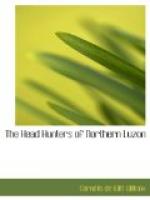We do not go so far as do some, and believe that the whole agitation is but a conspiracy to place the destinies of the Islands in the hands of an oligarchy. But, in all probability, a Tagalog oligarchy would be formed; for the capital, Manila, is Tagalog, the adjacent provinces are Tagalog, the wealthy class of the Islands on the whole is Tagalog, and there is no middle class anywhere. The mere fact that the capital is situated in the Tagalog provinces would perhaps alone determine the issue, apart from the fact that the Tagalogs are the dominant element, of the native population. Before granting independence, therefore, we should be reasonably sure that we are not in reality placing supreme control in the hands of a few.
But let us suppose that in fact the populations of the Archipelago were quite generally to ask for independence. We must again ask ourselves, How genuine or real would this demand be? It is not very difficult to answer this question. The Filipino is most easily led and influenced; indeed, it is to be doubted if anywhere else in the world a being can be found more easily led and influenced. [54] For example, it is relatively not an uncommon thing, certainly in the Tagalog provinces, for a man having a grudge against a neighbor to invite three or four friends to join him in boloing his enemy. The invitation is frequently accepted, although the guests may themselves have nothing whatever against the victim-to-be. Early in 1909, a miscreant who had been parading himself in women’s clothes as a female Jesus Christ, upon exposure by a native doctor, out of revenge got together a band of nineteen men, and with their help proceeded to cut the doctor to pieces. This occurred within a day’s march of Manila. The example just given suggests another Filipino trait, the readiness with which the more ignorant will swallow any and all religious nostrums, and form absurd sects, usually for the financial or other material benefit of their leaders. In yet another case, a murderous bandit [55] of Tayabas Province, a Tagalog province, whom we caught and very properly hanged, used to promise as a reward for any deed of special villainy in which he might be interested, a bit of independencia (independence), and then would show a box with the word painted on it, declaring that it contained a supply sent down to him from Manila. He never failed to find men to do his will. Our purpose in citing these examples, whose number might be indefinitely multiplied, is not to show that the poor, ignorant Filipino is especially criminal of disposition, but to point out the ease with which he can be led by other men. If, under evil influence, he will altruistically, as it were, consent to almost any crime, obviously he can be induced to consent to almost anything else. His consent or acquiescence can not be taken to indicate appreciation of the issue.




